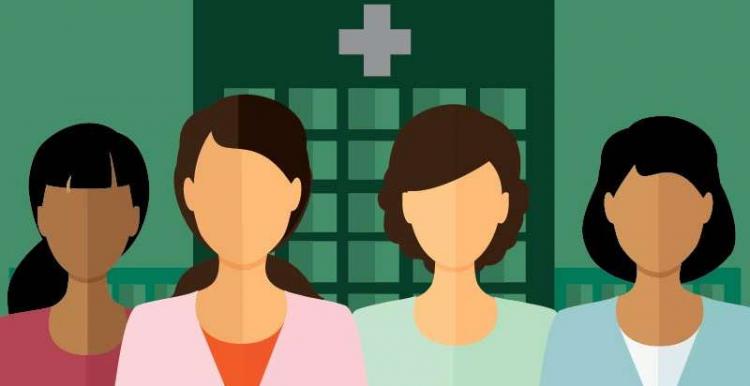Women in England want at home cervical screening tests on the NHS

A poll of 2,444 women hesitant about cervical screening has shown that three-quarters, 73%, would use a home testing kit if it was available free on the NHS.
We commissioned the poll to provide solutions to address hesitancy about cervical screening in a drive to support NHS England’s ambition to eliminate cervical cancer by 2040.
About self-testing kits
A self-testing kit, which detects human papillomavirus (HPV), a group of viruses that can lead to cervical cancer, helps women carry out cervical screening in the privacy and convenience of their own homes. HPV home kits are currently available to buy at pharmacies at costs of between £29 to £129 but they’re currently not available on the NHS.
Earlier this year, a trial led by Kings College London to offer women a self-testing kit concluded it could boost the number of women undergoing cervical screening by 400,000 a year.
Key research findings
Women's views on self-testing kits
Our research showed that when asked about the benefits of a self-testing kit, over half of respondents, 53%, chose "privacy", followed by "avoiding discomfort", 52%, and "easier to find time", 47%.
The findings also show that women's concerns about the accuracy of home testing would have to be addressed if it was rolled out.
What else would encourage women to take up cervical screening?
Women were also asked to choose out of 11 factors that would encourage them to take up cervical screening in the future. The most important for them were:
-
Sensitivity from healthcare staff about worries women might have about the examination and previous experiences, 62%;
-
A healthcare professional carrying out the screening being the same gender, 61%;
-
Ease of travelling to the screening appointment location, 53%; and
-
A wider choice of appointment times, for instance, in the morning or over weekends, 52%.
Main barriers to cervical screening
Cervical cancer is the 14th most common cancer among women in the UK.
Although it’s highly preventable through regular cervical screening, the NHS has not reached a target to screen 80 per cent of eligible women, over the past 20 years. Its uptake has been decreasing, with nearly a third of eligible women in England not coming forward for screening in 2023.
Feeling of discomfort
Around four in 10, 39%, of the respondents had never attended cervical screening previously and had greater concerns about some aspects of screening than those who had attended it before.
Half of women who’d chosen not to take up an NHS invitation for screening, said they were worried about physical discomfort, compared to 32% of women who’d taken up a screening invitation.
Embarrassment, worries, and misconceptions
Women who hadn’t attended screening were more worried about embarrassment, the potential result, or believed they didn't need it, compared to women who had taken up screening previously.
-
Over one in five, 21%, of women said they didn't feel the need to attend their appointment as they were not sexually active, while 15% said they had a past traumatic experience unrelated to screening.
-
Findings for all respondents also showed young women aged 24-29 were more worried about feeling physical discomfort, compared with women aged 60-64. This was also a greater concern for disabled women, 43%, than for non-disabled women, 36%.
-
Women of Asian heritage were more likely, 30%, than White, 26%, or Black, 20%, women to say one reason for their hesitancy was embarrassment at having to undress in front a healthcare professional.
Louise Ansari, Chief Executive of Healthwatch England said:
"Women's diverse voices and experiences must drive improvements to cervical screening and NHS England's ambition to eliminate cervical cancer by 2040.
"The strong support for free HPV home-testing represents a major opportunity to increase uptake of screening - we urge NHS England to adopt home-testing as an alternative screening solution.
“Until a decision is made on home testing, it’s clear that there should be no one-size-fits-all approach to the delivery of cervical screening. A personalised approach is vital for such an intimate procedure that for many women causes embarrassment or discomfort at best and fear and shame in the worst cases.
“The number one priority for most women was having empathetic and sensitive staff deliver the screening. This includes nurses or doctors who take time to answer questions beforehand, offer practical changes during the exam to reduce pain or discomfort, sensitively handle any past traumatic abuse that makes them fearful of intimate procedures, and who make adjustments for disabled women or people with extra communication needs.
“Women also told us they want more flexible appointment times or drop-in clinics to fit around busy lives involving work or caring responsibilities and we urge screening providers to work with their local Healthwatch to understand their community's needs."
Our recommendations
Our report "Cervical screening my way" also sets out recommendations for healthcare leaders, calling for:
- Solutions to ensure that disability and ethnicity data about people attending screening can be captured, analysed, and published alongside regional and age uptake data in the future.
- High-profile promotion of trusted sources of direct support and information for women.
- Training for admin and screening staff to meet their responsibilities regarding accessible information and adjustments to care.
- More flexible booking methods, appointment times and preferred locations for drop-in clinics.
- Introduction of an NHS-branded Trauma Card, based on a Healthwatch Essex initiative for affected women to bring to appointments.
- Adoption of self-screening as an alternative option offered to all women nationally who would prefer it, subject to the results of NHS-commissioned research on the safety and effectiveness of self-screening.
To learn more, read our report, which unpacks women's experiences with cervical screening and sets our recommendations for healthcare leaders.